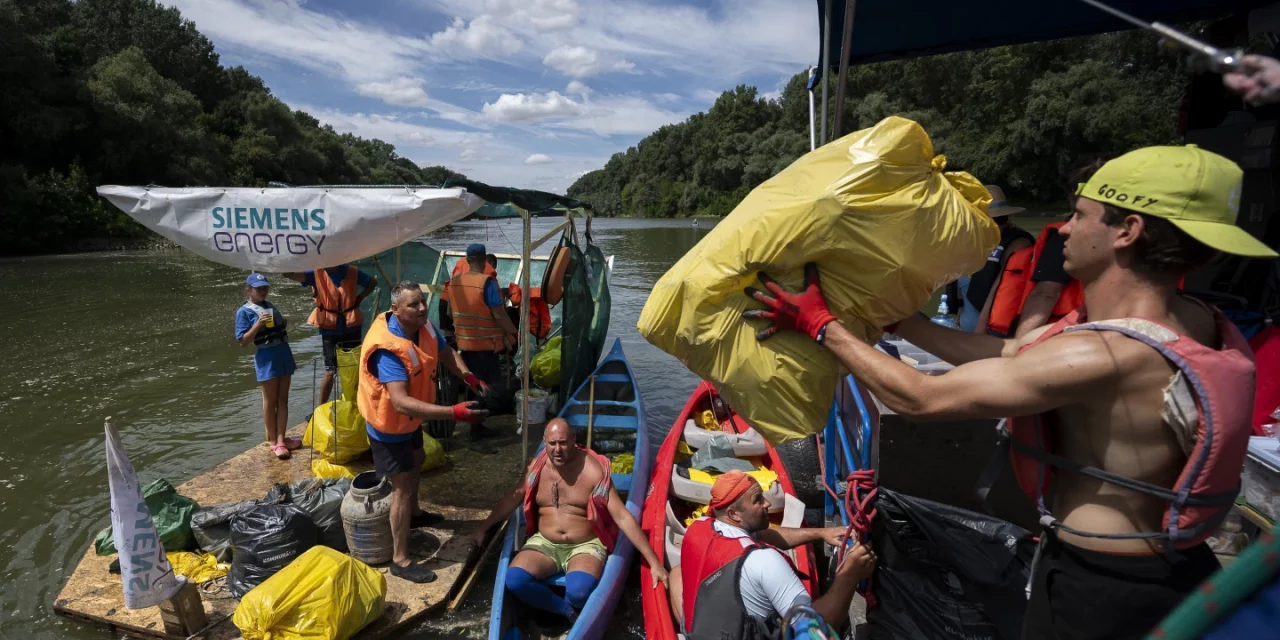In a triumphant display of collective action, 150 volunteers converged on the banks of the Tisza River in Hungary to combat the alarming issue of plastic pollution. This inspiring effort resulted in the removal of an astounding metric ton of waste in just a single day. The initiative was driven by the annual Plastic Cup competition, drawing over 150 passionate participants who dedicated their time to cleansing Hungary’s second-largest river of debris.
A River of Challenges
The Tisza River, a lifeline coursing through the Hungarian landscape, has long been grappling with a significant problem: plastic pollution.
The riverbanks often bear witness to the unsightly accumulation of muddy plastic bottles, Styrofoam fragments, and waterlogged rubbish.
This plastic plague poses a threat not just to the river’s ecosystem but also to the wider global environment, as plastics washed downstream can make their way into oceans, contributing to the formation of enormous debris fields known as gyres.
The Plastic Cup Competition: A Symbol of Unity
At the forefront of the battle against plastic pollution is the Plastic Cup competition, an annual event that unites volunteers from all walks of life.
This ten-day endeavor draws participants of various ages, each donning a life jacket and taking to the river in canoes. Their mission: to scour the waterway and its floodplain, ridding it of the trash that has marred its natural beauty.
The heartening unity displayed by these rivergoers transcends their backgrounds, forming a collective force for environmental change.
A Ton of Waste in a Day
On a recent day that will be remembered for its significance, volunteers managed to extract an astonishing metric ton of waste from the Tisza River.
This achievement exemplifies the power of dedication, showing that concerted efforts can yield remarkable results.
The muddy plastic bottles, Styrofoam fragments, and waterlogged debris that littered the river’s banks were removed by hand, a clear statement of the volunteers’ commitment to the environment.
A Growing Collection of Success
Since its inception in 2013, the Plastic Cup competition has contributed significantly to the battle against plastic pollution. Participants in this annual event have managed to amass over 330 tons (approximately 727,000 pounds) of waste from the Tisza River and other Hungarian waters. This growing collection of success stories highlights the tangible impact that proactive measures can have on the environment.
A Global Ecological Crisis Addressed
Zsolt Tamas, director of the Plastic Cup competition, underlines the broader implications of their efforts. He aptly points out that rivers play a pivotal role in the global waste pollution crisis. Waste that finds its way into rivers eventually makes its journey to the oceans, forming vast islands of debris. Tamas articulates a profound truth: “If we can prevent this global problem on the rivers, then less will enter the oceans.” By addressing the issue at its source, volunteers are effectively intercepting waste before it can further contribute to oceanic pollution.
A Proactive Approach to Change
Tamas emphasizes the critical nature of a proactive approach to plastic pollution. Preventing waste from entering rivers in the first place significantly reduces the downstream flow of debris into oceans. This strategy marks a shift from reactive cleanup to proactive prevention, exemplifying the power of tackling the root cause of a problem.
Contrasting Perspectives
Comparing the volunteer-driven efforts to the situation outlined in a 2021 report by Reuters underscores the stark difference between proactive and reactive approaches.
While volunteers work tirelessly to clean the Tisza River, the report describes the ongoing challenge of plastic influx due to flooding from neighboring countries.
This contrast serves as a reminder of the importance of initiatives like the Plastic Cup competition, where volunteers proactively address plastic pollution before it exacerbates.
Forging a Cleaner Path Forward
The image of volunteers, united by a common goal, removing tons of trash from the Tisza River serves as a beacon of hope. It shows that when individuals come together, positive change can be achieved, even in the face of daunting environmental challenges.
The Plastic Cup competition stands as a testament to the potential of collective action, demonstrating that through united efforts, we can forge a cleaner path forward for Hungary’s rivers and beyond. As the fight against plastic pollution gains momentum, these volunteers offer an inspiring example of how small actions can lead to significant environmental transformations.










